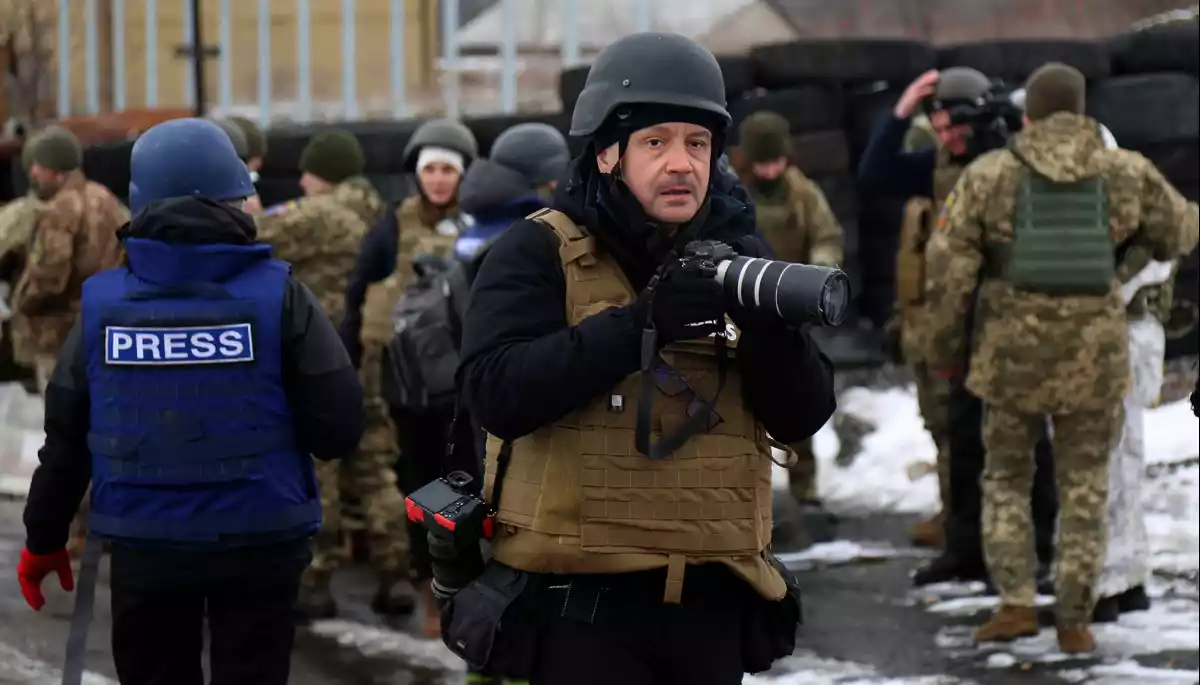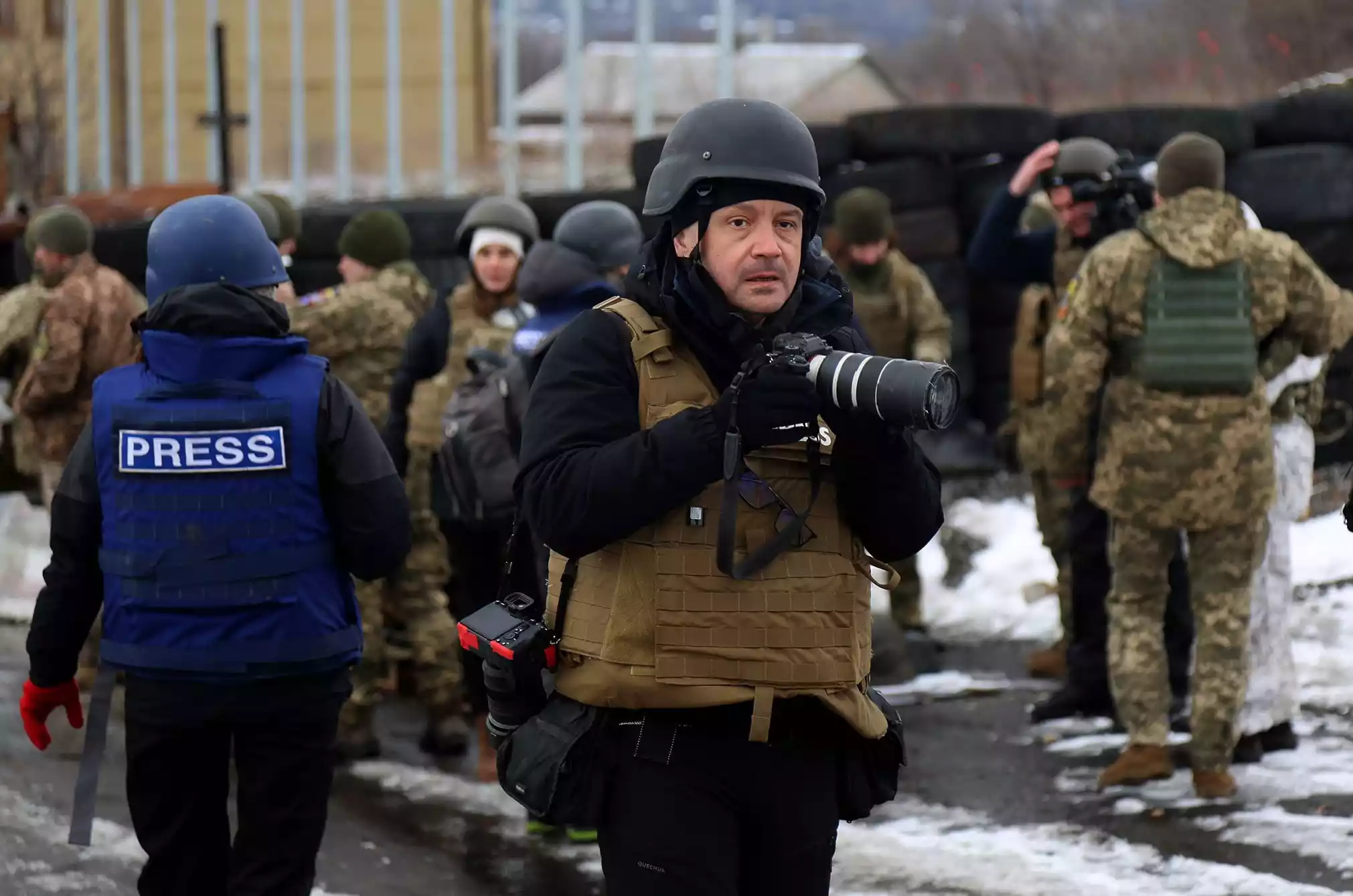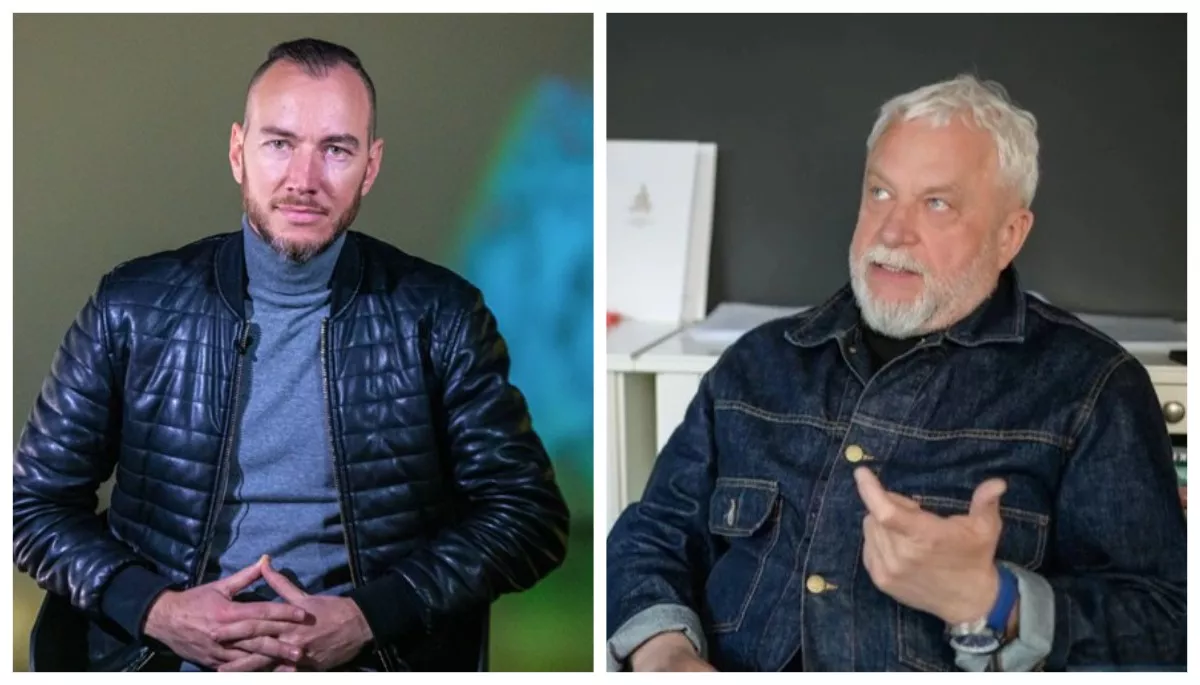
Open letter to media professionals who cover Russia’s invasion of Ukraine
Open letter to media professionals who cover Russia’s invasion of Ukraine


From: Ukrainian media organizations, reporters, photographers, media managers and communication professionals
Dear colleagues,
On February 24 2022, Russia began an unprovoked full scale invasion of Ukraine, a massive escalation of their eight-year war in Donbas in east Ukraine. Russia’s war is conducted along four axes, attacking all major Ukrainian cities with missiles, air strikes and in most instances, ground forces. Untold numbers of civilians and servicemen have been killed. In just over three weeks, more than three million Ukrainians have become refugees in Europe. Four members of the media community have been killed by Russian forces: Oleksandra Kuvshynova, Brent Renaud, Evgen Sakun and Pierre Zakrzewski.
Russian forces kidnap Ukrainian journalists in order to silence them, thus a Ukrainian journalist Viktoriya Roschina and Oleh Baturin spent 6 and 8 days in captivity after disappearing. Ukrainian photojournalist Maks Levin disappeared on March 13th while reporting from the frontline near Kyiv. A publisher from Melitopol Mikhail Kumok and three journalists - Yevgeniya Boryan, Yuliya Olkhovska and Lyubov Chaika - has been also detained for 1 day and have been pressured to collaborate with Russian occupational regime in their city.
Simultaneously Russia has been attacking our core values of truthful, fact-driven and honest reporting through continuous disinformation campaigns. Many people are not aware of the scale and depth of these campaigns, and their full impact is yet to be felt.
The effectiveness of these disinformation narratives did not happen overnight. They took time to seep into public discourse, capitalizing on misrepresentations or misunderstandings over language, history and politics, and exacerbating existing divisions in society until they began to stifle civil discussion.
This is why, as individual journalists and organizations from the Ukrainian media community who have battled with Russian information warfare since 2014, we would like to highlight the following points regarding the language used to describe this war. Some of them might not be obvious but are vitally important to us and a truthful representation of this war.
We ask media organizations to share this with their newsrooms and audiences:
1) One common error is to use terms like “crisis”, “conflict” or “military operation”, or call it “Ukrainian” i.e. “Ukraine Crisis” or “Ukraine conflict”. This is a full scale invasion of, and war against, Ukraine. We ask you to correctly indicate Russia’s role in the war with the wording “Russia’s war in Ukraine” and/or “Russian invasion of Ukraine”, especially in captions, headlines, leads and hashtags.
2) At the same time, we ask not to overuse the phrase “Putin's war”. Even though there is a temptation to believe that this war started only because of the Russian president, several polls from diverse polling organizations (Savanta ComRes, VCIOM, the research project "Do Russians Want War?") have reported that the silent majority of Russians – roughly 60 percent – support the war. During the first week of the war, public support for Putin in Russia grew from 60 to 71 percent. Russian soldiers on the ground are firing missiles and bombs, and deliberately killing civilians. Many of them do not have access to the facts and to independent media, but this does not take responsibility away from them.
3) Many refer to the 2014 pseudo-referendums in the Ukrainian territories of Crimea and Donetsk and Luhansk Oblasts as explanations for Russian military aggression. This is misleading. The territories of Crimea, and parts of Donetsk and Luhansk Oblasts, were annexed and occupied by Russian forces in 2014. Crimea was annexed by Russia in an unequivocal violation of international law. The war in Donbas was exclusively orchestrated and supported by the Russian State. The pseudo-referendums and proxy republics are not recognised by the international community. Experts (Orysia Lutsevych, Andrew Wilson, and Nikolay Mitrokhin to name a few) emphasize that neither the creation of the puppet "republics" in Donetsk and Luhansk nor the conventional war would have happened without Russian involvement. The current escalation demonstrates Russia’s desire to control the whole of Ukraine, and these “republics” are used as a platform for full-scale invasion and a tool for propaganda and disinformation.
● Additionally the quasi “republics” in Donbas are not another armed side of the conflict. They operate as part of the Russian army and mercenaries fighting in Ukraine. Using terms like “separatist-held areas” is therefore incorrect. Please consider using "Russian proxies".
4) Another common error we observe is to report Ukrainian and Russian positions as “two equal perspectives''. Russian positions are based on lies, propaganda and denial of the existence of Ukraine as a nation and state. Russian propaganda is not just “strategic communication” or another point of view, it is using disinformation to justify killing thousands of civilians and continuing a completely unprovoked war.
5) The narrative that characterizes the war as a proxy one between Russia and the West denies Ukrainian agency - something that the Ukrainian people’s resistance to invasion clearly demonstrates. NATO is an alliance based on the right of sovereign nations to collective defense, enshrined in Article 51 of the Charter of the United Nations. By focusing on ‘expansion’, the media are perpetuating the Kremlin’s justification for war and ignoring the democratic voice of the Ukrainian people who wish to live in peace, free from Russian aggression.
6) Finally, we implore you to include, engage and hear Ukrainian experts. The majority of international experts specialize in Russia or Eastern Europe. We ask to include Ukrainian experts, or those who have lived and worked in Ukraine in the journalism you publish about the war.
Information warfare and disinformation academics and experts warn that Russian tactics, perpetuated by its supporters here in the West and abroad, have one objective: to divide, deceive, sow doubt and create enough distrust of information that people do not know what to believe, and question even the most well-evidenced facts. They will play on the truths we tell ourselves and promises which go unkept. They will attack sentiments shared by, and within, ethnic, gender, linguistic and socio-economic groups. Disinformation aims to oversimplify existing issues and turn victims into perpetrators. We see this already with Russians supporting this war believing they are fighting NATO and "neo-Nazis" in Ukraine. We have seen it in the past with disinformation targeting the Syrian refugee crisis in Europe and the truth behind the downing of flight MH-17 in 2014.
A full and truthful account of this war is pivotal to defeating Russia’s information war, consisting of propaganda and manipulation targeted at Ukraine and at liberal democratic countries and institutions. Therefore, we believe that the public needs to be aware of how Russia will manipulate the effects of this war. They will attempt to weaponize behaviors which contradict our collective values, such as double standards towards refugees and racial discrimination against minority groups. They will attempt to hyper-charge the rise of nationalist movements, in order to deflect the blame from Russia to Ukraine, NATO and Europe. We believe that it is important to raise these issues now, to allow for a civilized and open discourse on how to collectively tackle these and future issues which undoubtedly will arise from this war.
Signed,
Media organizations:
Commission on Journalism Ethics;
Ukrainian Media Business Association;
National Union of Journalists of Ukraine, - Sergiy Tomilenko, President;
Institute of Mass Information - Oksana Romaniuk, director;
Internews Ukraine - Kostiantyn Kvurt, the head;
Regional Press development Institute;
Center for Democracy and Rule of Law;
Independent Media Council, Ukraine;
Ukrainian Media and Communication Institute - Diana Dutsyk, CEO;
Detector media NGO - Natalyia Lygachova, head, chief editor;
Souspilnist Foundation, - Taras Petriv, president;
Media Development Foundation - Eugene Zaslavsky, Executive Director;
Ukrainian Association of media psychologists and media educators - Lyubov Naydonova, President;
Suspilne (UA: PBC) - Angelina Kariakina, head of news;
Hromadske - Yuliia Fediv, CEO;
LB.UA - Sonya Koshkina, Editor-in-Chief;
Ukrayinska Pravda - Sevgil Musaieva, chief editor;
Zaborona Media - Katerina Sergatskova, editor-in-chief;
Roman Stepanovych, CEO;
Realnaya Gazeta - Andrii Dikhtiarenko, chief editor;
Glavcom (Information Agency) - Mykola Pidvezianiy, chief editor;
Dzerkalo Tyzhnia - Yulia Mostova, editor-in-chief.
Individual journalists, media professionals, experts
Emine Ziyatdinova, Independent Media consultant and documentary photographer. London, UK;
Nina Kuryata, Independent Media consultant. Kyiv, Ukraine;
Svitlana Ostapa, Supervisory Board of PJSC, the National Public Broadcasting Company of Ukraine, The Chair;
Maryna Synhaivska, "Ukrinform" National News Agency of Ukraine, Deputy Director General;
Liza Kuzmenko, Head of NGO “Women in the Media”, the CJE member;
Julia Smirnova, analyst and journalist, London;
Olena Dub, journalist, media-consultant;
Olga Yurkova, media trainer, media consultant;
Marichka Varenikova, freelance journalist and producer;
Oksana Parafeniuk, freelance photojournalist and producer;
Tetiana Stroi, CEO of Donetsk Press Club, media trainer, media expert;
Svitlana Yeremenko, CEO of Pylyp Orlyk Institute for Democracy, journalist, media expert;
Roman Kifliuk, independent media expert;
Anastasia Magazova, journalist and author, Berlin/Kyiv;
Anastasia Vlasova, visual storyteller;
Oksana Grytsenko, independent journalist;
Tetiana Pechonchyk, head of the Human Rights Center ZMINA, the CJE member;
Andrii Ianitskyi, Center for Journalism at Kyiv School of Economics, the head.











